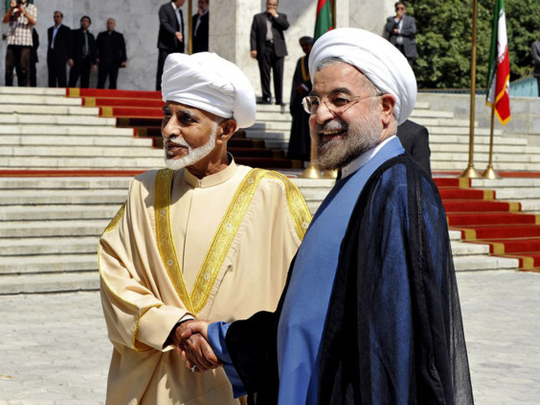
Muscat: In a first for the Gulf Cooperation Council states, Iranian President Hassan Rouhani will be visiting the Sultanate of Oman on Wednesday, according to Iranian Students News Agency, Isna. He will be accompanied by a high-level delegation.
The Iranian president is expected to witness the signing of several important agreements between the two countries, including the construction of a causeway that will for the first time connect Iran and the GCC by land, over the strait of Hormouz.
Iranian Ambassador Ali Akbar Sibeveih said the plan aims to boost ties between the two countries,
Rouhani will discuss “means of strengthening bilateral relations” as well as “security and stability” in the region, Tehran’s ambassador in Muscat, Sibeveih said on Monday.
He will also discuss the “Syrian crisis and ways of peacefully resolving it,” he added.
The ambassador said that the causway would be a symbol of “peace and friendship between Iran and Oman, other GCC countries and Yemen,” according to Al Watan daily newspaper. He said that the bridge would further help in strengthening relations between Iran and Oman.
Rouhani’s visit comes against a backdrop of mounting internal tension among members of the Gulf Cooperation Council, which includes Oman.
Saudi Arabia, Bahrain, and the UAE last week withdrew their envoys from Doha, accusing the emirate of meddling in their internal affairs and backing Islamists.
Sibeveih declined to comment on the row, telling reporters in Muscat that “these are internal GCC affairs”.
“We hope people and countries in the region can live together in peace, security, and consensus,” he said.
Oman has so far not reacted to the latest developments in the Gulf.
Sultan Qaboos, who maintains historically good relations with Tehran, visited Iran in August for a visit focused on economic and diplomatic issues.
Qaboos has acted as an intermediary between Western countries and the Islamic republic.
The sultanate is reported to have hosted secret talks between Iran and the United States ahead of the signing in Geneva last November of an accord between world powers and Iran on its nuclear programme.
Rouhani is the second Iranian leader to visit Oman since the 1979 Islamic Revolution. His hardline predecessor Mahmoud Ahmadinejad visited the sultanate in 2007.
The Iranian ambassador also revealed earlier in the week that the Islamic Republic plans to build one of Oman’s biggest hospitals. The 400-bed hospital be located in a complex that will also include a hotel, and will be staffed with Iranian specialists practising in Iran and the West, and nurses will be exclusively Omani.
Sibaveh said the aim was to create jobs for Omanis. The hospital will be completed in three years, local media said. Iran also plans to set up two pharmaceutical factories in the sultanate. Omani and Iranian media noted that around 5,000 Omanis visited Iran in 2012 to seek treatment, especially eye surgeries, adding that a third of Iranian visas issued in Muscat were for medical tourism.












